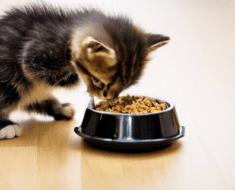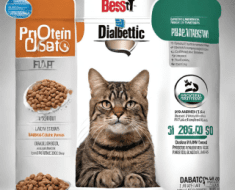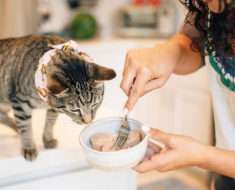Yes, kittens can eat adult cat food, but it is not recommended as it may lack essential nutrients for their growth. Kittens have specific dietary requirements that should be met to ensure proper development and health.
It is best to feed kittens specially formulated kitten food until they are fully grown to support their unique nutritional needs. Adult cat food may not provide the necessary nutrients and calories needed for kittens to thrive. Consult with a veterinarian for guidance on the appropriate diet for your kitten to promote their well-being and growth.
Remember, a proper diet is crucial in ensuring your kitten grows up strong and healthy.
The Nutritional Needs Of Kittens And Adult Cats
Kittens have different nutritional needs than adult cats, requiring higher protein and fat content. Their growth and development depend on specific nutrients. Adult cat food may lack these essential elements, potentially harming a kitten’s health. It’s vital to provide kittens with a specialized diet tailored to their unique requirements.
| Kittens have special nutritional requirements that differ from adult cats. |
| Adult cat food may lack vital nutrients essential for kitten growth. |
| Balanced nutrition is crucial to prevent health issues in both kittens and adult cats. |
Potential Risks And Health Concerns
Feeding kittens adult cat food can result in digestive and developmental issues. Kittens have different nutritional needs than adult cats, including higher protein and calorie requirements. Improper nutrition can lead to digestive upset and may affect growth and development. It is important to feed kittens a balanced diet specifically formulated for their growth. Consult your veterinarian for guidance on appropriately feeding your kitten to ensure optimal health.
Transitioning From Kitten To Adult Cat Food
Transitioning from Kitten to Adult Cat Food requires a gradual approach. It’s important to follow specific guidelines for a smooth transition. You should start by mixing small amounts of adult cat food with the kitten’s usual food. Then, over a 7-10 day period, gradually increase the proportion of adult food. Always monitor the kitten closely during this time to ensure it does not show any signs of digestive discomfort. If the kitten experiences any health issues, consult a veterinarian for advice. Overall, a slow transition is key for a kitten’s well-being when shifting to adult cat food.
Best Practices For Feeding Kittens And Adult Cats
Feeding kittens appropriately ensures their healthy growth and development. While it may be tempting to feed them the same food as adult cats, it is crucial to understand their unique nutritional needs. Kittens require a diet that is rich in essential nutrients, such as protein and vitamins, to support their rapid growth. High-quality kitten food specifically formulated for their needs is recommended.
A gradual transition from kitten to adult cat food should take place as the kitten matures. Adult cat food typically contains fewer calories compared to kitten food, which prevents weight gain in adult cats. However, it is important to ensure that adult cat food still provides adequate nutrition for the feline’s needs. Consulting with a veterinarian can help determine the most suitable feeding schedule and portion sizes for your cat.
| Kitten | Adult Cat |
|---|---|
| Feed kitten food specifically formulated for their needs | Gradually switch to adult cat food as they mature |
| Feed 3-4 times a day | Feed 2-3 times a day |
| Provide appropriate portion sizes based on weight and age | Monitor portion sizes to prevent weight gain |
| Ensure fresh water is always available | Continue providing fresh water |
Remember to consult with your veterinarian for specific guidelines tailored to your kitten’s needs, as some kittens may have unique dietary requirements.
Consulting A Veterinarian’s Advice
Consulting a veterinarian’s advice is essential when it comes to deciding whether a kitten can eat adult cat food. Professional recommendations vary based on the specific needs of the kitten. In general, it is not recommended to feed adult cat food to a young kitten as it may lack the necessary nutrients for their growth and development.
A veterinarian can provide customized feeding plans, taking into consideration the age, size, and health condition of the kitten. They can guide on the appropriate kitten food or recommend transitioning to adult cat food at the right time. Kittens have different nutritional requirements compared to adult cats, and a veterinarian can help determine the best diet for their individual needs.
Feeding a kitten a proper diet is vital for their overall health and wellbeing. Consulting a veterinarian ensures that the kitten receives the necessary nutrition to grow into a healthy adult cat.
Frequently Asked Questions Of Can A Kitten Eat Adult Cat Food
What Happens If My Kitten Eats My Older Cat Food?
If your kitten eats your older cat’s food, it can cause nutrient imbalance and upset stomach. Monitor their food separately to maintain their health and avoid any issues.
When Can Kitten Eat Adult Food?
Kittens can start eating adult food when they are around 1 year old, once they have reached their full growth and development. Gradually transition them to adult food to prevent digestive issues.
Can A 6-Month-Old Kitten Eat Cat Food?
Yes, a 6-month-old kitten can eat cat food. Choose a high-quality kitten food to meet its nutritional needs.
What Is The Difference Between Kitten And Adult Cat Food?
Kitten food is specially formulated for their growing needs, while adult cat food provides essential nutrients for a fully developed cat. Kitten food promotes healthy growth, while adult cat food maintains overall health and energy levels.
Conclusion
It’s essential to provide a balanced diet for kittens. Adult cat food lacks essential nutrients for growth and development. Always check the label for kitten-specific formulas. This ensures your feline friend gets the appropriate nutrition required for a healthy and happy life.
With proper care, your kitten will thrive.





